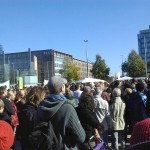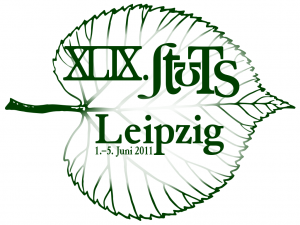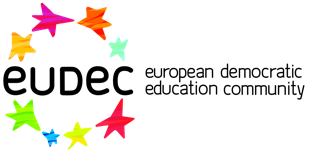
I just got back from Leipzig’s #globalchange festival/demonstration. At one point, I noticed two guys holding up an Israeli flag, and went over to ask what that’s about. It was the only national flag present and I wasn’t sure what it was doing there. “We’re here to provoke,” said one of the guys. “This demonstration is structurally anti-Semitic.” The idea, of course, is that a demonstration with anti-elite, anti-banker sentiment is anti-Semitic, whether the demonstrators know it or not. I tried to argue against this odd rhetoric, but he quickly said he doesn’t want to discuss it.
These counter-demonstrators are, I gather, anti-Germans. This is a movement considered to be left-wing and anti-fascistic, with a commitment to unconditional solidarity with Israel. The paradox of the “provocation” I witnessed is that this was the only mention of the “banking=Jews” stereotype I could detect in today’s demonstration, or indeed in all of the Real Democracy Now activities that led up to it in the past half year. It seems to me like the anti-Germans were the only ones bringing anti-Semitism into the demonstration. It annoys me to no end that they weren’t open to discussion, and this post is my attempt to say what I would have told them if they were willing to listen.
I recently read a pamphlet titled “The Past Didn’t Go Anywhere”, a fascinating guide to understanding and combatting anti-Semitism targeted at social change activists. It can be found online [PDF] and I highly recommend reading it, especially if you are involved in any kind of movement for social change. It makes the crucial point that anti-Semitism is:
“a divide-and-rule strategy that has served to maintain ruling classes, conceal who actually has power, and confuse us about the real systems of oppression that pit us against one another.”
(Chris Crass, Quoted on a now-defunct website hosting the pamphlet.)
Historically, rulers and ruling elites have used anti-Jewish sentiments to deflect the anger of the oppressed masses towards a relatively powerless group (Jews). In a way, it comes down to rulers explicitly or implicitly fostering the belief that the Jews, not the rulers themselves, are the problem.
What those anti-Germans were trying to do today was the same in reverse – delegitimizing an expression of legitimate grievance against the ruling class by claiming it’s an illegitimate expression of intolerance against Jews. This makes me pretty angry, I have to say. If I had detected any anti-Semitic sentiment or rhetoric from the demonstrators, I would go berserk. But I felt very comfortable at the demonstration, felt it was a matter of global solidarity, explicitly inclusive to me (with my irrelevant Jewish background) and to anyone else. The first thing that made me uncomfortable there was the anti-Germans with that big Israeli flag. How dare they insinuate that the German banking system is controlled by Jews? Where the heck did they get that idea?
You know what, I don’t actually know the names and backgrounds of any major German bankers. And I don’t need to. We were demonstrating against the absurd situation in which Europe and the world are in crisis yet the number of millionaires in Germany has only increased. We were demonstrating because we’re told things are going to get hard and we have to live in fear of economic collapse while those who were involved in creating this mess have nothing to fear and they continue to control much more wealth than the rest of us. Even if it so happened that 99% of German bank owners are Jewish, this wouldn’t have been an anti-Semitic demonstration.
Speaking out against someone who happens to be a Jew is not anti-Semitism. Speaking out against “the Jews” or attacking someone because they’re a Jew is anti-Semitism. Is those anti-Germans’ approach supposed to somehow protect Germany from a resurgence of anti-Semitism? Seems to me like at the very least, it muddies the waters and creates confusion about what is or isn’t anti-Semitic, making it easier for real intolerance to fly in under the radar. Even worse, it can actually re-enforce anti-Semitism by suggesting that speaking out against the powers that be is speaking out against Jews – supporting the false equation that “(the) Jews” are responsible for the power structures we live within.
There. I think I got it out of my system now. Has anyone else encountered similar situations, where people meaning to fight intolerance end up implicitly encouraging it?
]]>
I’m very busy lately, and will be over the next few weeks, because I’m organizing a student conference on linguistics (called StuTS, pronounced “shtuts”) here in Leipzig, June 1-5.
Posts will probably be few and far between until after that. Or not, if I badly need to write stuff.
If you’re a student of linguistics in reasonable range of Leipzig, please come, it’s gonna be awesome!

 I’m at the live EUDEC Council meeting, taking place here in Leipzig. We’ll be sporadically tweeting, Facebooking, and blogging from here.
I’m at the live EUDEC Council meeting, taking place here in Leipzig. We’ll be sporadically tweeting, Facebooking, and blogging from here.
My normal posts will continue next week.
]]>
After my previous guest post Beware: Adult Content generated a high volume of traffic to Michael’s blog, he invited me back, and I will be contributing occasionally (even though we both know what really drove the traffic surge were the key words “adult content”). As I end my visit to Leipzig I offer you a piece I wrote during a previous visit two years ago. It is long.
My German Manicure
By Shoshana London Sappir
I am ushered to a downstairs room in the beauty salon. The manicurist, walking a step behind me, says something in German about “links.” My mind flashes straight to Dr. Mengele on the platform. Links – left –means life. Rechts – right – means death. She wants me to take the seat on the left, I realize. I sit down.
“English?” I ask. She struggles with the words “only a little,” giggles and shrugs. I answer with a big smile, trying to convey: “Don’t worry, we’ll be just fine.”
The woman, in her mid-forties with dark-framed glasses, brown hair tied back in a pony tail and a white smock, places a folded white towel on each of my knees. Then she places a deep bowl of soapy water in front of me, signaling me to dip my fingers in the holes. While we wait, she asks me in German where I live. I figure it out from the word “haus.”
“Israel!” I answer, gleeful with comprehension. “Mein kind lives hier,” I explain, mixing English with scraps of Yiddish that float up from my childhood. She understands and asks me if he is a student at the “uni.” I don’t know how to say “sort of,” or that he is starting next fall, so I say “ja,” and add proudly, albeit half in Russian, that he speaks German.
Our conversation is going very well. She asks me to take off my rings and tells me that she has a daughter who is living in London and speaks English. We laugh at the symmetry. We are both mothers of grown-up children who live away from home and speak each other’s respective languages. I ask if her daughter is a student and she says no, “arbeit.” “Arbeit macht frei!” a bell rings in my mind. I know that word!
I am treating myself to some pampering while I wait for my son to get off work at his new job in Leipzig, Germany. He is 19 years old and has lived here for nine months.
I never really saw Michael as an adult before this visit. Last time I saw him, I reminded him to take a sweater and asked him if he had enough money. Now I am his guest, and it is he who is taking care of me: he made me my hotel reservation; he speaks for me when we order from a menu and he even coaches me in manners. He claims I talk too loud when we walk in the street or sit at a restaurant. Funny, in Israel I always thought of myself as the quiet one.
The manicurist takes my right hand in her left and starts on it with an oversized glass nail file. All evidence to the contrary, she makes another attempt to find out if we have any language in common: “Sprechen Sie Deutsch?” she tries. “English,” I start counting off on my fingers, “Hebraisch,” she shakes her head apologetically, “Russische” – here I lilt my voice hopefully – it is the former East Germany after all, and if she had paid any attention in school we would have something to work with – but no, she is sorry to indicate; “Spanische,” I continue, and she is by now feeling pretty bad about herself. I sum it up with a shrug and then I remember what I majored in at university. “Arabische!” This just makes her file a little harder.
And it makes me think about the irony of speaking so many languages but being so utterly unequipped to deal with the present moment. I love studying languages and until now I thought I had mastered more than enough of them to serve the needs of one lifetime. Yet here I am, literally speechless. I have definitely been studying the wrong languages. I could just as soon have known German by now. But how could I have known my son would end up in Germany? Conversation has come to a halt; I am staring into space while the manicurist focuses on my hands.
But the dialogue goes on in my head. How did you come to be from Israel and have a son living here? I imagine her asking me. Well, it’s a long story, I say. Actually, his grandmother on his father’s side was a German Jew, but she had to leave because of the war. Oh, that’s too bad, her imaginary voice in my head says, and her glib tone of voice surprises me. She does not sound sufficiently embarrassed, horrified or guilty and I get the feeling she does not know that much about the war. I remember that I read somewhere that the generation of this woman’s parents didn’t speak much about the war, and the post-war generation grew up with a kind of void regarding the past; some of the more eloquent members of that generation – my generation, in fact – tell of a feeling of sitting on a huge secret, knowing there are things you don’t ask about and don’t talk about, and if you are sensitive and conscientious you might find that eerie, creepy and crazy-making; moreover, from what I have heard, the Soviet-satellite East of Germany, of which Leipzig once was a part, did not commit to the same process of self-examination as the West. And as I have already figured out, if she had been a good student she would know some Russian and we would be having this conversation out loud and I could ask her.
But, in the imaginary ignorance I silently attribute to her, she apparently does not share my outrage at her people – maybe even her father, grandfather, uncles, the grownups who raised her, the people who came to her childhood birthday parties – who went all the way to Kaunas, Lithuania, to round up and kill my great grandparents, and my mother’s 11 uncles and aunts, including little Dvosha – my grandmother’s baby sister born in the old country long after she herself left for America – Dvosha, who a surviving cousin told me read Hebrew at four, recited entire Psalms by heart at five and died sometime between the ages of six and nine.
Because the woman filing my nails has only vaguely ever heard of any of these atrocities, I imagine, my resentment growing, they do not weigh down on her conscience, and therefore being a German cosmetician who is doing the nails of a Jew from Israel whose son is a would-be student in Leipzig is not a terribly charged experience for her, and the story I find myself telling her in response to her imaginary question about how my son ended up here comes out different from the one I usually tell myself or people who ask me about it in Israel.
In this simplified version of the story, Michael’s paternal grandmother had to leave Germany “because of the war” – more specifically, directly from Bergen Belsen, but that’s just another place she never heard of, so I won’t complicate things by mentioning it – and he decided, well, to come back. And I think for today we can leave out the part about how in the interval his grandmother was part of founding the State of Israel, how my family moved there from America to be part of the miracle of the return to our Jewish homeland after two thousand years of exile, and that at one time we believed that now that we had our own state we and our children would never want to live anywhere else. All of that may be implied when another Jew asks me what Michael is doing here, here in the land of the killers, of all places outside of our Holy Land, but in this little room in a beauty salon populated by a work-weary woman who is massaging my hands with cream, I will keep it simple, one mother to another, proud of our young-adult children venturing out into the world to seek their futures. Why ruin a perfectly sunny day in May with all those dark memories, unfathomable ironies and unanswerable questions when we just came here to have a little fun?
“Everything okay?” she asks, looking up from my left hand, which she is holding in both of hers and rubbing.
“Everything’s fine,” I smile back at her.
My husband’s Uncle Meir, who unlike his parents and siblings fled Germany before the war, is emphatic about not visiting the sins of the fathers on the sons: “This generation had nothing to do with that,” he told me. So I look at this kind lady and tell myself: “It is not her fault she was born to a bunch of murderers.” Nor was Michael responsible for the dreams of his fathers. He rebelled against the idea that just because he was born a Jew in Israel he had to be religious or Zionist. He is neither.
It pained me when Michael announced that in Germany he felt at home. This is not something I expected to hear from my Israeli-born son. But I suspect the grandmother he never met passed on certain subtle aspects of German culture to his father, who passed them on to him, giving things in this country a familiar, comfortable feel. Before Michael I had almost never heard a Jew say anything positive about Germany: I heard a lot of people say they would not set foot there – including my husband, until he changed his mind – and that they “couldn’t stand the sound of the German language.” Even though Israel has maintained relations with Germany for more than 40 years now, most of the people I know can not resist making a snide comment at the mention of that country. Few met the news of Michael’s moving there with equanimity. For a long time I couldn’t say the name of the country out loud. I would say “my son went to Europe.” One day I took the bus home from my Russian class with a classmate, and she told me she had a daughter who was living “in Europe.” To which I said “I have a son in Germany too!”
Yet, Michael states plainly that Germany’s public civility and cleanliness make him feel comfortable and welcome here, just as much as Israel’s noise and chaos always bothered him.
So you see, I wrap up my closing argument in my imaginary answer to the cosmetician’s question about how my son ended up here, I thought my son would stay in Israel, with us, but he decided to move away and live here, just like young people do all the time, just like your daughter in London, I tell my new friend, although still silently, in my head, as she massages some cream into the backs of my hands.
I am so engrossed in thought that it takes me a while to notice something is amiss. I don’t see any bottles of nail polish in the room. This is not like any of the manicures I have ever had, surrounded by hundreds of colorful little bottles forcing me to make a deliciously agonizing choice. For half an hour my hands have been massaged, peeled and rubbed with cream, my cuticles have been poked and my nails have been filed, but where is this going? When I try to broach the issue, I am so anxious I can’t think of any pseudo-German word for “color” or even “red,” so I try faking it with an accent, coming out with something like “ruhd,” gesturing and lapsing into English: “Where are the colors?”
The manicurist points to a shelf behind me, on which there are six bottles of polish, all nearly indistinguishable shades of bright pink. I ask, in English, if that’s all. Yes, it is. I choose the darkest one, hoping it is redder than it looks, but when she paints my pinky nail it comes out electric pink, and I scream: “No, no, no, forget about it!” This cuts right through the language barrier.
She wipes it off and continues her program of cream, peeling, mask and massage as I try to get over my shock. I try to put a positive spin on my disappointment. I have been having hand pains for some time because I type so much, and maybe, I comfort myself, I am getting just the treatment I need even though I didn’t ask for it. But still, it said “manicure” on their sign and that is what I asked for. Is it possible that the only word in German I had no doubt about, that I thought I really knew, that I didn’t try to cobble together out of fragments of two thousand years of globe-spanning Jewish linguistic history, could the word “manicure” have more than one meaning? Could they take it literally to mean “hand treatment,” without nail polish? Apparently they could and they did and they charged me 25 euros.
I go out into the street staring at my boring, colorless nails in disbelief. I could have filed my nails and put cream on my hands myself. What did I just pay 25 euros for? What is wrong with this country? When I meet Michael at my hotel I am indignant.
“I can’t believe what just happened,” I begin my rant.
“What’s the matter?” he asks.
“I went for a manicure, at that place we saw the other day, and look, look!” I shove the backs of my hands into his face.
“Yeah, what?”
Boys, I sigh. My daughter would have gasped. “No color! No nail polish!” I spell it out to him. “What’s the point of getting a manicure if you don’t get your nails polished?”
“What a bummer.”
“And it cost me twice as much as it does in Israel!”
“No kidding.”
“What is wrong with these people?” I scream. “You tell me. What kind of people are they?”
“Mom?”
“What?!”
“Come with me,” he says.
And I look at my son, mein kind, this six-foot man with a blond pony tail who makes waitresses blush, this citizen of the world who knows his way around town and speaks the language, and I feel safe and cared for and I follow.
He leads me across the street, holding a hand to my elbow, gently reminding me to watch out for the trams. He takes me to the drug store and for another 10 euros I get my favorite shade of braun.
]]>